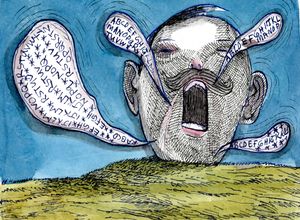Thomas Babington Macaulay was endowed with an encyclopaedic memory—could recite Paradise Lost and Pilgrim’s Progress eyes closed; recalled 40 years later the entire lines of two poems penned by a country versifier that he had read at the age of 13 in a weekly paper on way to school. As a child he was precocious, and had a hunger for books and words. Once a servant spilled hot coffee on his legs; when the hostess asked him a while later how he was feeling, the four-year-old replied, “Thank you, madam; the agony is abated.”
Everyone would agree that the longest-lasting legacies of British rule in India, good, bad or ugly, have been two Ls—the law and the language. Both were legated by this man who had an elephantine memory, a liberal mind (he, father Zachary, and uncle Colin, who had played a key role in defeating Tipu and was resident in Travancore, were all passionate campaigners against slavery in the colonies), but a mulish contempt for oriental scholarship as his infamous Minute on Indian Education would show. Ironically, a social media post doing the rounds in India portray him as a grudging Indophile! That much of our WhatsApp scholars.
Everyone would also agree that one of his 2 Ls has become obsolete. Now Amit Shah has come with three sets of laws that seek to replace Macaulay’s Penal Code, as also the obsolete Criminal Code and the Evidence Act. The new laws, assures Shah, should abate our legal agonies.
No quarrel. Some of us may disagree with a clause here, a section there, or a provision elsewhere in Shah’s laws. Those are matters of detail which we can discuss in the next few weeks in seminars, TV studios, and media columns. The bills are now with a standing committee of Parliament, where a few members from both houses will agonise over every section, subsection, clause, comma, colon, and semicolon, and will come out with suggestions. The houses will draw points from these discussions, and will debate, dissect, delete, dump or pass the laws when they meet in winter.
Law-making is an agonising task. More so when the laws that are being made are not plain acts, but entire codes that can decide whether a man goes to embrace the gallows or his girl. Therefore, Speaker Sir and Chairman Sir, allow the houses ample time to debate. Laws made in haste will be regretted in leisure.
What about the other L? That’s where M.K. Stalin and many more have raised a point. Why are the laws titled only in one language? Why not in English too, as all other bills have been? Stalin thinks Shah is imposing Hindi, but Shah says the titles are not Hindi. The words are Sanskrit, but then Sanskrit has no higher status than Santhali or Sindhi, Telugu or Tamil, or any of the 22 languages listed in Schedule 8.
Unlike what many believe, and even a Supreme Court order nearly misled us recently, Hindi is not ‘the national language’ of India. It is “the official language of the Union”, but the Constitution says that English too shall remain in use alongside.
And like it or not, English remains the language of the law, whether the law is Macaulay’s or Amit Shah’s. Article 348 says, “the authoritative texts” of all bills and amendments moved in either house of Parliament or state legislatures, of all acts passed by them, and of all ordinances promulgated by the president or the governors, shall be English.
Hon’ble Members, please bear this in mind while you debate, discuss and dissect the laws. We agonised over the language in the 1960s. Let’s not throw our beloved India that is Bharat into another bout of linguistic agony.
prasannan@theweek.in


